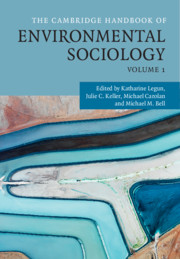Book contents
- The Cambridge Handbook of Environmental Sociology Volume 1
- The Cambridge Handbook of Environmental Sociology
- Copyright page
- Contents
- Figures
- Tables
- Contributors
- Foreword
- Introduction
- Part I Theory in Environmental Sociology
- 1 Classical Theory and Environmental Sociology: Toward Deeper and Stronger Roots
- 2 Globalizing Environmental Sociology
- 3 An Embodied Materialist Sociology
- 4 The Environmental Sociology of the Good: Nature, Faith, and the Bourgeois Transition
- 5 Microsociological Perspectives in Environmental Sociology
- Part II The Economy and Environmental Sociology
- Part III Culture and Environmental Sociology
- Part IV Politics, Power, State
- Part V Social Justice
- Index
- References
2 - Globalizing Environmental Sociology
from Part I - Theory in Environmental Sociology
Published online by Cambridge University Press: 05 November 2020
- The Cambridge Handbook of Environmental Sociology Volume 1
- The Cambridge Handbook of Environmental Sociology
- Copyright page
- Contents
- Figures
- Tables
- Contributors
- Foreword
- Introduction
- Part I Theory in Environmental Sociology
- 1 Classical Theory and Environmental Sociology: Toward Deeper and Stronger Roots
- 2 Globalizing Environmental Sociology
- 3 An Embodied Materialist Sociology
- 4 The Environmental Sociology of the Good: Nature, Faith, and the Bourgeois Transition
- 5 Microsociological Perspectives in Environmental Sociology
- Part II The Economy and Environmental Sociology
- Part III Culture and Environmental Sociology
- Part IV Politics, Power, State
- Part V Social Justice
- Index
- References
Summary
This chapter discusses what a more thoroughly globalized environmental sociology might look like, and the need to re-think more deeply the ways in which we conceptualize environmental sociology. Five challenges are discussed: i) the need to better understand globalization itself and the emergence of new sources and forms of authority; ii) the socially uneven causes and impacts of global environmental problems and injustices; iii) the task of democratizing science by asking whose voices are missing and whose knowledge counts in the understanding of global environmental matters; iv) the need for a more cosmopolitan environmental sociology that is sensitive both to local particularities and to shared concerns at the national and transnational levels; and v) the question of how environmental sociology might contribute to debate about possible and desirable global futures. The chapter concludes by arguing that responding to these challenges and engaging productively with other disciplines requires a sociology that unsettles boundaries between the social and natural sciences and partipates on equal terms in the production of environmental knowledge.
- Type
- Chapter
- Information
- The Cambridge Handbook of Environmental Sociology , pp. 30 - 46Publisher: Cambridge University PressPrint publication year: 2020
References
- 2
- Cited by



